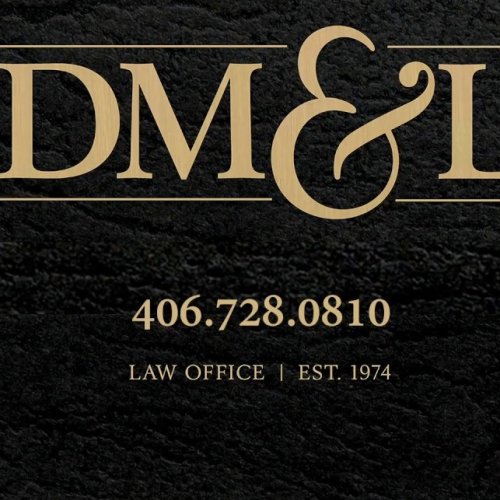Best Nursing Home Abuse Lawyers in Missoula
Share your needs with us, get contacted by law firms.
Free. Takes 2 min.
List of the best lawyers in Missoula, United States
About Nursing Home Abuse Law in Missoula, United States
Nursing home abuse refers to any intentional or negligent act by staff or caregivers in a nursing facility that causes harm or distress to residents. In Missoula, United States, there are laws in place to protect nursing home residents and ensure their well-being. If you suspect nursing home abuse, it is crucial to understand these laws and take appropriate action.
Why You May Need a Lawyer
Seeking legal help is important in various situations related to nursing home abuse. Some common scenarios where you may need a lawyer include:
- If you suspect your loved one is being abused or neglected in a nursing home.
- If you believe that the nursing home failed to provide a safe environment for residents.
- If you have evidence of medical malpractice or medication errors.
- If your loved one has suffered physical, emotional, or financial harm due to nursing home abuse.
- If you need assistance in filing a complaint or pursuing legal action against the nursing home.
Local Laws Overview
In Missoula, United States, several laws govern nursing home abuse cases. Some key aspects of local laws include:
- Missoula has specific regulations that nursing homes must follow to ensure the safety and well-being of residents.
- Residents have the right to be treated with dignity, respect, and receive appropriate care.
- The law requires nursing homes to have sufficient staffing to meet the needs of residents.
- Nursing homes must maintain clean and safe premises, including providing proper nutrition and medication.
- Families of nursing home residents have the right to access their loved one's medical records.
Frequently Asked Questions
Q: How can I identify signs of nursing home abuse?
A: Look out for signs such as unexplained injuries, sudden weight loss, poor personal hygiene, emotional withdrawal, and changes in behavior. It is essential to trust your instincts and take action if you suspect abuse.
Q: What should I do if I suspect nursing home abuse?
A: Document any evidence, such as photographs or written accounts of incidents. Report your concerns to the nursing home administration, and if necessary, contact local authorities and adult protective services. Consider seeking legal advice to protect the rights of your loved one.
Q: How can I prove nursing home abuse?
A: Proof can be obtained through medical records, photographs, witness statements, surveillance footage, and expert testimony. A lawyer experienced in nursing home abuse cases can guide you on gathering evidence and building a strong case.
Q: Can I sue the nursing home for abuse?
A: Yes, if you have evidence of nursing home abuse or neglect, you may be able to file a lawsuit against the facility. Consult with a lawyer who specializes in nursing home abuse law to understand the legal options available to you.
Q: How long do I have to file a nursing home abuse lawsuit?
A: The statute of limitations determines the time period within which you can file a lawsuit. In Missoula, United States, this time limit can vary depending on the circumstances. It is important to consult with a lawyer promptly to understand your specific timeframe.
Additional Resources
Here are some resources, governmental bodies, and organizations that can provide helpful information and support:
- Missoula County Department of Health - Elder Abuse Program
- National Center on Elder Abuse
- Eldercare Locator - Administration on Aging
- Missoula Legal Services
Next Steps
If you need legal assistance in a nursing home abuse case, it is crucial to take the following steps:
- Contact a reputable lawyer who specializes in nursing home abuse law.
- Arrange a consultation to discuss the details of your case.
- Provide any evidence or documentation related to the abuse.
- Cooperate with your lawyer in building a strong legal strategy.
- Follow their guidance throughout the legal process.
- Ensure the rights and well-being of your loved one are protected.
Lawzana helps you find the best lawyers and law firms in Missoula through a curated and pre-screened list of qualified legal professionals. Our platform offers rankings and detailed profiles of attorneys and law firms, allowing you to compare based on practice areas, including Nursing Home Abuse, experience, and client feedback.
Each profile includes a description of the firm's areas of practice, client reviews, team members and partners, year of establishment, spoken languages, office locations, contact information, social media presence, and any published articles or resources. Most firms on our platform speak English and are experienced in both local and international legal matters.
Get a quote from top-rated law firms in Missoula, United States — quickly, securely, and without unnecessary hassle.
Disclaimer:
The information provided on this page is for general informational purposes only and does not constitute legal advice. While we strive to ensure the accuracy and relevance of the content, legal information may change over time, and interpretations of the law can vary. You should always consult with a qualified legal professional for advice specific to your situation.
We disclaim all liability for actions taken or not taken based on the content of this page. If you believe any information is incorrect or outdated, please contact us, and we will review and update it where appropriate.








